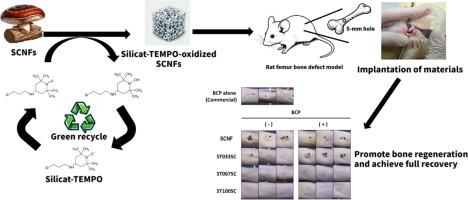通过绿色催化剂 Siliacat tempo 氧化囊壳素的生物活性基质支架用于促进骨再生
IF 6.2
Q1 CHEMISTRY, APPLIED
Carbohydrate Polymer Technologies and Applications
Pub Date : 2024-09-30
DOI:10.1016/j.carpta.2024.100576
引用次数: 0
摘要
骨再生仍然是骨科医学面临的一项严峻挑战。细胞外基质蛋白在仿生矿化和成骨过程中发挥着重要作用。通过 TEMPO 氧化的 Sacchachitin 纳米纤维(SCNFs)由于引入了模拟天然细胞外基质的羧基而显示出作为生物材料支架的巨大潜力。然而,TEMPO 对环境有害,因此需要更环保、更可持续的替代品。因此,本研究通过 SiliaCat-TEMPO(SiliaCat-TEMPO,STEMPO)作为可再生催化剂,并加入不同量的氧化剂,探索了氧化-SCNFs 的绿色制备方法,以评估其骨再生能力。我们开发了一种最佳 STEMPO 氧化工艺,可通过离心有效去除大部分 STEMPO 颗粒,残留物极少。回收的 STEMPO 粒子的氧化效率与新鲜粒子相当。STEMPO 氧化的 SCNFs 在 NaClO 含量增加的情况下,羧酸含量从 0.1360 mmol/g 增加到 3.2415 mmol/g。此外,STEMBO 氧化的 SCNF 与 MC3T3-E1 成骨细胞具有良好的生物相容性,可促进钙沉淀、细胞迁移和成骨分化。氧化程度较高的β-磷酸三钙(BCP)和 STEMPO 氧化 SCNF 的混合复合材料进一步促进了成骨分化。使用大鼠股骨缺损模型进行的体内研究表明,最高氧化水平(ST100SC)的 SCNFs 能显著促进骨再生,使骨完全恢复,骨体积与组织总体积(BV/TV)之比达到 75.6%,而对照组为 48.3%。这些结果表明,氧化程度较高的 STEMPO 氧化 SCNFs 可用作生物活性基质支架,实现骨再生的完全恢复。本文章由计算机程序翻译,如有差异,请以英文原文为准。

Bioactive matrix scaffold of oxidized sacchachitin via green catalyst of siliacat tempo for enhancing bone regeneration
Bone regeneration remains a critical challenge in orthopedic medicine. Extracellular matrix proteins play important roles in bionic mineralization and osteogenesis. Sacchachitin nanofibers (SCNFs) oxidized via TEMPO have shown great potential as biomaterial scaffolds due to the introduction of carboxylic groups that mimic the natural extracellular matrix. However, TEMPO is harmful to the environment, which calls for greener and sustainable alternatives. Therefore, this study explored the green fabrication of oxidized-SCNFs through SiliaCat-TEMPO (STEMPO) as a renewable catalyst with various amount of oxidation agents to evaluate their bone regeneration ability. We developed an optimal STEMPO oxidation process, enabling efficient removal of most STEMPO particles through centrifugation with minimal residue. The oxidation efficiency of recovered STEMPO particles remained comparable to fresh ones. STEMPO-oxidized SCNFs, oxidized at increasing NaClO levels, showed an increase in carboxylate content, from 0.1360 mmol/g to 3.2415 mmol/g. Additionally, STEMPO-oxidized SCNFs exhibited excellent biocompatibility with MC3T3-E1 osteoblastic cells, facilitating calcium precipitation, cell migration, and osteogenic differentiation. Mixed composites of β-tricalcium phosphate (BCP) and STEMPO-oxidized SCNFs with higher oxidation levels further enhanced osteogenic differentiation. In vivo studies using a rat femur defect model showed that SCNFs at the highest oxidation level (ST100SC) significantly promoted bone regeneration to full recovery, achieving a bone volume to total tissue volume (BV/TV) ratio of 75.6 %, compared to 48.3 % in the control. These results demonstrated that STEMPO-oxidized SCNFs with higher oxidation levels can be used as a bioactive matrix scaffold to achieve full recovery of bone regeneration.
求助全文
通过发布文献求助,成功后即可免费获取论文全文。
去求助

 求助内容:
求助内容: 应助结果提醒方式:
应助结果提醒方式:


